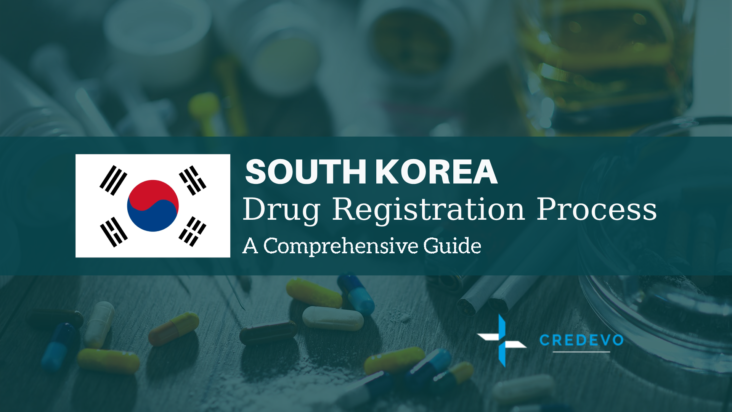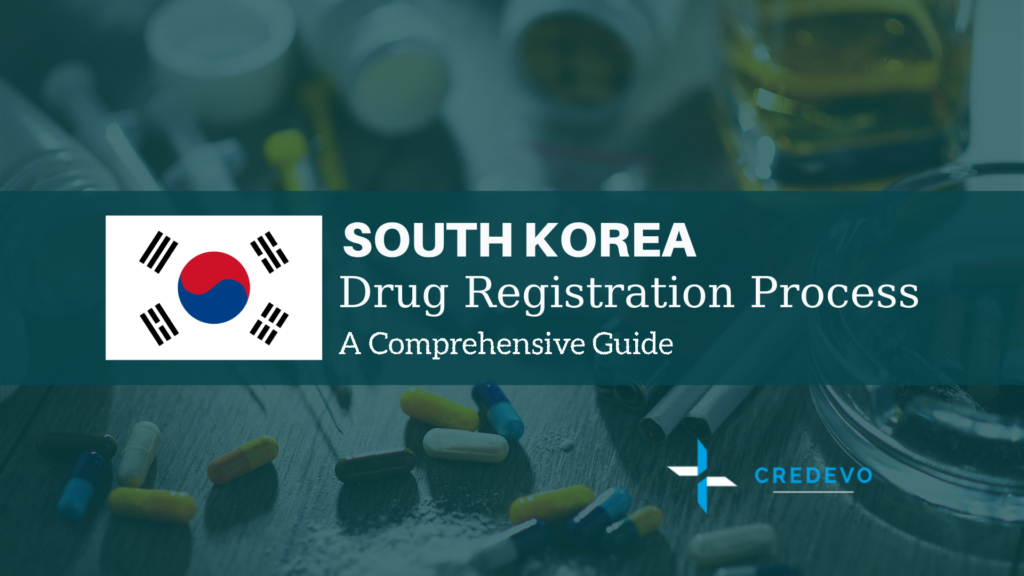Drug Registration & Approval In South Korea: A Comprehensive Guide

As South Korea emerges as a focal point for new drugs, understanding the drug registration and approval process becomes crucial for those intending to market their products in the country. With a population that values advancements in healthcare, there’s a constant search for effective treatments and solutions in South Korea.

The demand extends across numerous medical conditions, creating opportunities for pharmaceutical companies to introduce new and improved drugs. In the coming years, South Korea’s pharmaceutical industry is predicted to expand fast, with earnings to reach $13.18 billion by 2024.
Before exploring the regulatory process in South Korea, let’s examine the reasons you might consider registering your drug in the country.
What are the advantages of registering your drug in South Korea?
Registering your drug in South Korea offers advantages such as access to a thriving pharmaceutical market with increased credibility. It opens doors to ensure compliance with regulations, fostering trust among healthcare professionals and patients.
Let’s discuss some advantages you have by registering your drug in South Korea.
- Good market access: The South Korean pharmaceutical market offers opportunities for increased sales and market share.
- International recognition: Approval in South Korea enhances your drug’s global credibility, indicating adherence to stringent regulatory requirements.
- Collaborative opportunities: Registration fosters collaboration with local healthcare entities, opening doors to potential research partnerships and collaborations.
If you are willing to market your drug in South Korea, it’s necessary to explore how drugs get approved in South Korea and understand the rules that guide the process. This article breaks down the steps and rules to get a new drug accepted in South Korea.
The regulatory authority and compliance for drug registration in South Korea
The regulatory authority overseeing drug registration in South Korea is the Korea Ministry of Food and Drug Safety (MFDS). It is crucial to comply with the standards set by the MFDS to get your drug approved.
These guidelines guarantee that the medication satisfies the needed efficacy, safety, and quality. The regulatory process involves submitting detailed documentation, including clinical trial data.
Adhering to these regulations is essential for successful drug registration, ensuring that the product is safe for use and meets the necessary criteria.
Can foreign manufacturers apply for drug registration in South Korea?
Foreign pharmaceutical companies can request drug approvals in South Korea. Yet, they need a representative in South Korea to manage the application and make sure they follow the rules.
What’s an ICC?
- In South Korea, the person holding the registration for a medical product must be a local person, known as the In-Country Caretaker (ICC).
- Foreign medical companies can designate an independent ICC in Korea to manage their product registrations on behalf of the foreign manufacturer if they do not have a local office in Korea or do not wish to use their distributor as the representative.
- The ICC in Korea is responsible for applying to the Ministry of Food and Drug Safety for product approval, ensuring accurate Korean labeling, and handling tasks like documenting adverse events or product failures.
- Furthermore, the ICC can serve as a liaison between the overseas producer and its Korean distributor, facilitating the exchange of information required for certification.
What are the different types of drug approvals in South Korea?
- New Drug Approval (NDA) or Biological License Application (BLA): Getting approval for a new drug, known as New Drug Approval (NDA) or Biological License Application (BLA), is the strictest process. It’s mandatory for all new drugs that haven’t been sold in South Korea before.
- Generic drug approval: For generic drugs (those like already approved brand-name drugs), there’s a simpler process called generic drug approval.
- Biosimilar drug approval: Biosimilar Drug Approval is the process of approving drugs similar to already approved brand-name biological products.
Are there any expedited pathways available for drug approvals in South Korea?
Yes, South Korea provides accelerated drug approval procedures to evaluate and approve new medications quickly. The priority review prioritizes drugs for severe diseases, while the conditional approval allows earlier access based on promising results.
These pathways aim to expedite the delivery of necessary treatments to patients.
Priority review
Priority review is for drugs treating severe or life-threatening conditions, providing notable benefits over current treatments.
Conditional approval
Conditional approval allows early authorization based on promising but limited clinical data, with a commitment to further post-marketing studies.
Breakthrough therapy designation
Drugs with early clinical evidence of a substantial improvement over current therapies for severe conditions are designated as breakthrough therapies, triggering a priority review procedure.
What are the requirements for submitting a drug application?
Submitting a drug application in South Korea comes with different requirements. The NDA/BLA application includes various dossier packages:
- Safety and efficacy review
- GMP review
- Administrative review
These packages cover many topics, including bridging data and GMP site inspection.
The drug registration process
Introducing a new drug in South Korea follows a careful process overseen by the Ministry of Food and Drug Safety (MFDS). This detailed procedure confirms the drugs meet strict safety and effectiveness standards before getting approval for distribution.
Let’s discuss the steps of the process below.
Step 1: Preparation & submission of documents
Preparation of documentation: Gather all necessary paperwork, including clinical trial data, product details, and quality control information for creating a comprehensive application.
- Quality control and assurance: Ensure that the drug meets stringent quality standards through rigorous quality control processes, verifying its safety and effectiveness.
- Clinical trial approval: Having clinical trial data is crucial for approval as it allows for the assessment of the drug’s safety and efficacy in controlled settings. For further information about the clinical trial approval process in South Korea, please click here.
- Drug Master File (DMF) submission: Submit a Drug Master File, providing detailed information about the drug’s manufacturing, processing, and testing methods.
- Submit investigation new drug (IND), new drug application,(NDA) application to the MFDS: MFDS conducts the IND application review. If the MFDS does not require supplementary data, the NDA is approved.
- Prepare the application dossier for drug approval: The application dossier generally includes
- Origins of backgrounds leading up to discovery and development
- Stability test data
- Pharmacological effects
- Toxicity data
- Product structure
- Clinical data
- New products must fulfill the requirements of the MFDS new drug application (NDA).
Step 2: Review of documents by MFDS
- Submit the applications to the MFDS management division for drug approval and review.
- The MFDS reviews the submitted materials, evaluating their safety, efficacy, and quality.
- Then MFDS generates a report outlining the application dossier and submits it to the MFDS drug and evaluation department.
- MFDS drug and evaluation department inspects manufacturing facilities: The MFDS conducts inspections of the drug manufacturing facilities to ensure they meet regulatory standards. This process includes the following
- Initial assessment
- Technology
- Safety
- Efficacy
- Clinical trial data
- Product standards
- Good manufacturing practice data
- Drug master file data
- Impacts on intrinsic and extrinsic factors.
Step 3: Approval & Post Approval
- Approval or rejection: The MFDS decides whether to approve or reject the drug application based on the review and inspection.
- Post-marketing surveillance: After approval, monitor the drug’s performance in the market, reporting any adverse events or unexpected issues.
- Market launch: With approval and successful surveillance, launch the drug on the market, making it available for medical use.
What are the post-approval requirements?
People holding licenses for NDA and BLA applications in South Korea must regularly send safety and risk management plan reports and results from post-marketing surveillance (PMS).
The timeline for the drug registration process
- The timeline for the drug registration process in South Korea can vary based on factors such as the type of application, the complexity of the drug, and the regulatory pathway chosen. Generally, it involves several stages, including submission, review, and approval.
- The entire process can take several months. Expedited pathways as priority reviews may shorten the timeline for drugs addressing critical health needs.
- It’s essential to consult with regulatory experts for specific timelines based on the nature of the drug and the chosen regulatory pathway.
Fees associated with the registration process
The fees associated with the drug registration process in South Korea vary depending on factors such as the type of application, the complexity of the drug, and the services provided by regulatory consultants.
Fees may include:
- Application fee: to submit the registration application.
- Review fee: Associated with the regulatory authority’s evaluation of the application.
- Renewal fee: If applicable, for maintaining the drug registration over time.
- Consultancy fee: Companies may incur additional costs if they plan to engage with local representatives or regulatory consultants.
Do you have any further questions about registering your drug in South Korea?
If you have any additional questions or require our assistance with registering your drug in South Korea, please feel free to contact us using the form provided below.